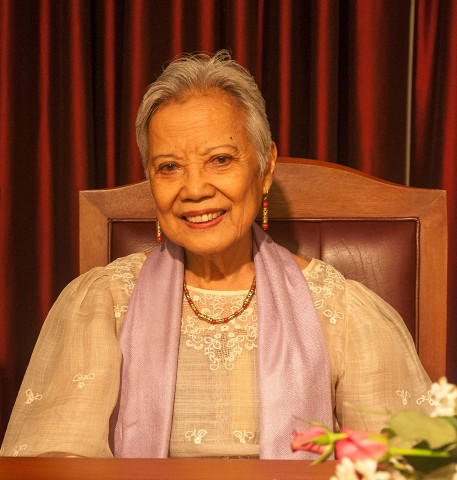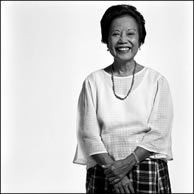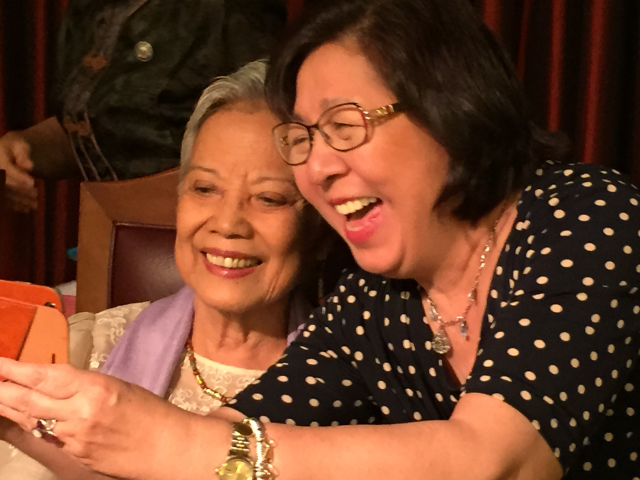by Luz Maria Martinez

Leticia Ramos Shahani with Congressman Belmonte (L) and elder brother, former President Fidel Ramos.
Dr. Leticia Ramos Shahani, whose life can hardly be categorized into one area of work, was honored on June 9, 2015 by the House of Representatives and the Committee on Women and Gender Equality of the Philippines for her valuable contributions in shaping the women's global agenda and pioneering initiatives for the empowerment of women through a national resolution.
For those of who may not know who she is, she is no less than the first co-author of the UN Convention on the Elimination of All Forms of Discrimination Against Women (CEDAW). The first working draft was known as the Philippine-Soviet Draft, and she is among the top-ranking women of the UN. Shahani, served as Chair of the UN Commission on The Status of Women; Secretary General of both the Third UN World Conference on Women and Seventh Congress on Crime Prevention and Treatment of Offenders. She served as UN Assistant Secretary General for Social Development and Humanitarian Affairs.

Photo Credit: Lila Shahani
Pulling sections from a Women in Action (2005) interview for Isis International when she was Chairperson of the Board of Trustees for Isis International (2002-2004), she talks to Rosanna Langara in an article entitled Lessons, Leaps and Linkages: the UN Experience in Retrospect about her experiences in the UN.
In the article, Shahani describes how women's issues were marginalised in the 1960s. There were few high-ranking women officials and women ambassadors. "The majority were men." "It was a man's world," " We were fighting for a niche, which did not yet exist." In the beginning, there was very little interest in women's rights at the UN. "People thought it was a joke — they were laughing at it," Shahani recalls. "There was hardly any awareness."
A point she makes in her acceptance speech on June 9, 2015, she shared that at the time she was a diplomat it was tough to be a woman.
Listen to an excerpt of her acceptance speech ![]()
In 1974, Shahani chaired the UN Commission on the Status of Women (UNCSW). The Commission then recommended that 1975 should be celebrated as "International Women's Year" and that there should be an international women's conference in Mexico City.
The "International Decade for Women" was declared by the UN from 1976 to 1985 with the theme, "equality, development, and peace." "That is a trilogy that I like very much," Shahani says. Equality encompasses equal rights between women and men, development covers economics and social issues, and peace deals with the political aspect.

When Shahani was appointed secretary-general of the "Third World Conference on Women," she was concurrently UN's Assistant Secretary-General for Social Development and Humanitarian Affairs. Intensive preparations went underway for two years. Five regional meetings and four preparatory conferences were conducted. A policy document was prepared and discussed during this process. It became the basis for the Nairobi Forward-Looking Strategies (NFLS).
Women's issues were regarded as welfare issues then. Women were not considered part of the political and economic agenda. "We had to reverse that in Nairobi. In other words, we had to reaffirm the equality of rights between men and women. In development, women certainly had an economic role," Shahani states.
"I'm at least satisfied that Nairobi was part of a process that began in Mexico. You could say that Nairobi was not also possible if Mexico and Copenhagen did not take place. We were part of the process. But I think some of the major battles were fought in Nairobi," explains Shahani.
Nairobi made the BPFA possible: gender mainstreaming, identifying women in the lesser known areas, trafficking in women. In 1985, these issues were not so new anymore. "So, when I went to Beijing to head the Philippine delegation, I felt a certain sense of satisfaction and accomplishment."

In 2006 Equality Now, an international organisation working for the promotion and protection of women's rights, had started a campaign calling on the UN Security Council to recommend a woman candidate as Secretary-General to the UN General Assembly.
The campaign organiser drew up a list of nominees to show that there was no dearth of qualified women to choose from. The list included current and former heads of state, foreign ministers, and UN under-secretaries, such as the executive director of the UN Population Fund, Thoraya Obaid of Saudi Arabia; the former Chilean defence minister Michelle Bachelet Jeria; the current Latvian President Vaira Vike-Freiberga; and Leticia Ramos Shahani, former UN Assistant Secretary-General and former Philippine Senate President.

Leticia Shahani with Oyie de Dios taking a ‘selfie’
Her rich experience in the UN also helped Shahani to become an effective legislator for gender. "When I became a Philippine senator in 1987, that experience had helped me formulate some of the laws that, I think, contributed much to raising the status of women in our country." Some of these laws include the "Shahani Law," which addresses gender discrimination at work; the Anti-Rape Law of 1997; and a law providing for the five percent gender and development budget allocation for all government agencies.
Her life journey has included many twists and turns being Dean at Miriam College for the College of International, Humanitarian and Development Studies, where she spear-headed innovative programs including the National Women's Summit with Women and Gender Institute Director, Aurora "Oyie" Javate de Dios.
 Leticia Ramos Shahani was born in the province of Pangasinan in the Philippines. She completed her undergraduate work in "English Literature" in 1951 at Wellesley College in Massachusetts. She had her graduate studies in "Comparative Literature" at the Columbia University in New York, and was awarded a doctoral degree in "Comparative Literature" with highest honors from the University of Paris in Sorbonne.
Leticia Ramos Shahani was born in the province of Pangasinan in the Philippines. She completed her undergraduate work in "English Literature" in 1951 at Wellesley College in Massachusetts. She had her graduate studies in "Comparative Literature" at the Columbia University in New York, and was awarded a doctoral degree in "Comparative Literature" with highest honors from the University of Paris in Sorbonne.
She speaks several languages and at the ripe age of 85, is now running her own business of Carabao milk and cheese which she produces on her farm where she spends time thinking about the state of farming in the country and working with farmers to adapt more efficient forms of farming.
Luz Martinez is a faculty member in the College of International, Humanitarian and Development Studies. Miriam College, Philippines. She served as Editor-in-Chief of WiA and was a former board member and Chair of Isis International.





 The
The 
 Isis Resource Center holds one of the largest feminist collections of materials in the Global South. With 40 years of publication experience, Isis holds a vast collection.
Isis Resource Center holds one of the largest feminist collections of materials in the Global South. With 40 years of publication experience, Isis holds a vast collection.